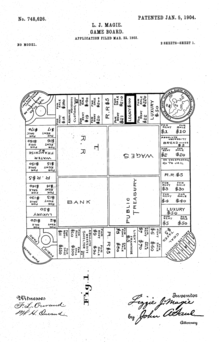The Landlord's Game
The Landlord's Game is a board game patented by Elizabeth Magie in 1904 .
The board game , intended as a " landlord's game", is modeled on the real estate market with its elements : the players collect rent claims from one another and pay taxes to a joint fund .
As an advocate of the ideas of the economist Henry George (cf. Georgism ), E. Magie wanted to convey his economic policy ideas more easily to “ordinary” people. It was supposed to show the dangers of monopoly land ownership and the resulting impoverishment of the rural population. Her biographer, Mary Pilon, wrote, "Her stated aim was to show the evil of increasing money at the expense of others."
"In a short time, I hope in a very short time, men and women will understand that their poverty stems from the fact that Carnegie and Rockefeller may have so much money that they don't know what to do with it."
"In a short time, I hope a very short time, men and women will discover that they are poor because Carnegie and Rockefeller, maybe, have more than they know what to do with."
With the elements of the game and also with the structure of the game board, Magic's game is very similar to the now much better known Monopoly by Charles Darrow from 1930: On March 19, 1935, Parker Brothers bought the patent for The Landlord's Game from her. This day is called and celebrated today by Hasbro as the "birthday of the Monopoly game".
Although numerous similar games were played in the USA at the beginning of the 20th century, The Landlord's Game is at least the first of its kind, which is also documented by a patent. Since patent claims usually expire after 20 years, Elizabeth Magie revised her game concept and was awarded a second patent starting in 1924 .
From 1974 onwards there was a legal battle between General Mills , at that time owner of Parker Brothers (Monopoly, author: Charles Darrow) and Ralph Anspach ( Anti-Monopoly , author: Ralph Anspach), in which the aim was to clarify whether the latter game would be taken off the market must be taken. As a result of this lawsuit, according to sources before the US Supreme Court , it was ruled that Monopoly is a copy of The Landlord's Game , which has been in circulation since 1904 . Reference was made to other, also earlier, games with the same name and gameplay, such as Atlantic City Monopoly (before 1930) or Finance (1932). Magic's game was thus indirectly confirmed to be at least the oldest patented game of its genre.

Individual evidence
- ^ A b c badische-zeitung.de , March 19, 2015, Chris Melzer ( dpa ): The richest wins: Board game Monopoly turns 80
- ^ Ric Stephens: Urban Planning Games and Simulations: From Board Games to Artificial Environments. In: Simulation and Gaming in the Network Society, p. 253 doi : 10.1007 / 978-981-10-0575-6_19
- ↑ Mary Pilon: Lizzie Magie invented Monopoly, so why haven't we heard of her? The Guardian , April 10, 2015.
